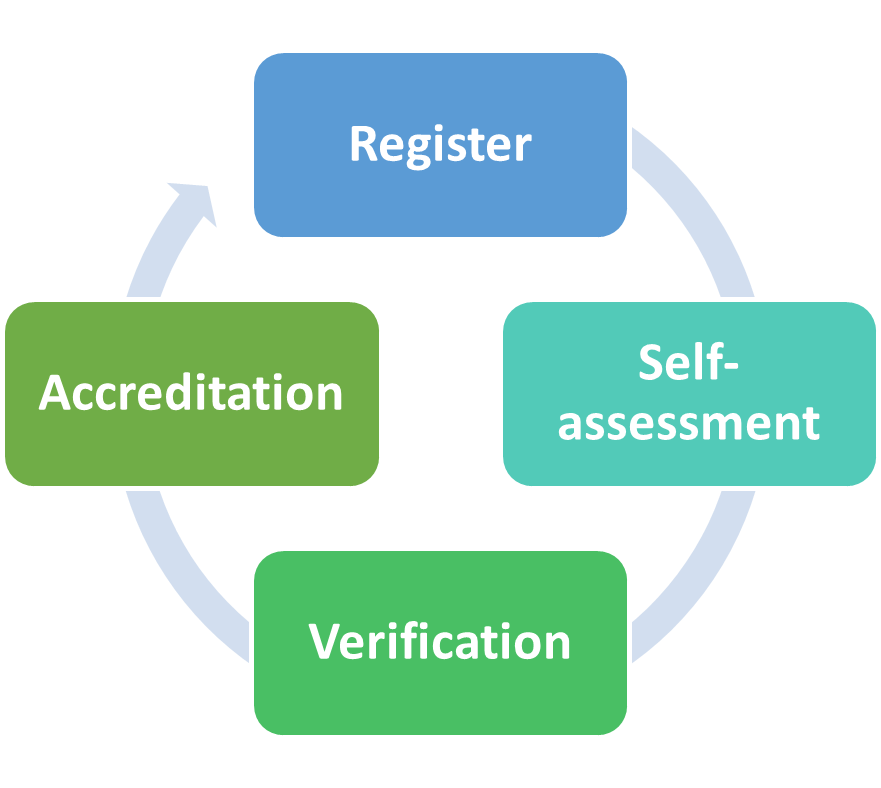We’ll tell you more about the assessment process when you register for the Independent Living Standards, but briefly there are four stages:
1. Registering – you need to sign up to the standards
2. Self-assessment – you tell us how you meet the standards
3. Verification – our Assessor will examine your evidence and undertake an accreditation visit
4. Accreditation – you are designated an Independent Living Standards accredited provider. If you don’t currently meet the standard, you will be given an action plan to help you achieve accredited status.

The verification process
Your Assessor will develop with you a plan for gathering evidence to support your achievement against the Standards.
They will incorporate as many ‘ordinary’ activities as possible, e.g. staff meetings, board/trustee meetings, resident forums, etc. Additional activities may still be needed to ensure a fair and robust assessment.
Accreditation is based on evidence examined by the Assessor gathered in a number of different ways:
➢ Attending existing events e.g. staff meetings, board/trustee meetings, resident meetings, etc.
➢ On-site verification visits
➢ Face-to-face and phone/e-mail discussions with staff, clients, board members/trustees, other key stakeholders
➢ Job shadowing
➢ ‘Virtual’ information gathering e.g. a website search of the organisation, access to your Intranet etc.
Although the main focus is on experiencing evidence, our Assessor may still ask for some evidence in advance.
What you need to do to prepare
- Provide a completed Introductory Statement with basic information about your service, delivery, staff, etc.
- Carry out a self-assessment of your services against the Standards. You will not need to produce evidence but to provide your Assessor with an initial indication of the performance level you think your service is.
- Ensure staff complete workbooks – these are really useful for your Assessor, and are a valuable support tool for staff if they are chosen to take part in any accreditation activity.
Erosh Independent Living Standards – Expectations
When you register for the erosh Independent Living Standards to ensure the accreditation process is as painless and efficient as it can be, we have set about below our expectations of you and what you can expect from us.
We expect you to:
- Nominate a Lead Officer, senior enough to take decisions in relation to the accreditation process, who will be the main point of contact; and let us know if there is a change to this role.
- Provide sufficient and appropriate resources to facilitate successful completion of the accreditation process.
- Ensure the evidence you present reflects an accurate representation of service delivery.
- Maintain regular contact with your Assessor.
- Undertake development and assessment activities within 6 months from the date of registration.
- Let us know as soon as possible of any significant changes to the service(s) being accredited.
- Inform service users and key stakeholders that you are working towards accreditation, meaningfully involve them in the process (including face to face, telephone, or email interviews), and keep them informed about progress.
- Inform service users and key stakeholders about how they can express concerns about any practice as you work towards accreditation.
- Champion the erosh Independent Living Standards with colleagues within and outside of the organisation.
- Commit to an annual review and re-assessment in order to maintain accreditation.
- Pay the fees associated with your accreditation plan before the start of the process. If you withdraw at any time, we cannot refund fees. If fees are outstanding, we will continue to request payment under the terms and conditions of the invoice and will not issue you with your final report.
In return you can expect erosh to:
- Appoint appropriately trained and knowledgeable Assessors.
- Maintain regular contact with you.
- Act as a critical friend to help you work towards and achieve accreditation.
- Provide an impartial and professional advice and support service.
- Provide a complaints and appeals process